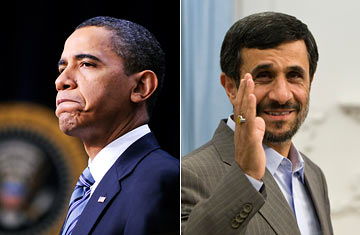
U.S. President Barack Obama and Iran's President Mahmoud Ahmadinejad
Having concluded that President Obama's outreach has failed to halt Iran's nuclear program, the final weeks of 2009 find his Administration focused on mustering support for new sanctions against the Islamic Republic. Iran's rejection of the terms offered thus far by the U.S. and its partners has prompted Obama to largely revert to the Bush Administration's approach of ultimatums backed by sanctions — with little obvious prospect of producing a substantially different result.
Obama campaigned for the presidency promising a game-changing diplomatic outreach, noting that President Bush's efforts had failed to prevent Iran from achieving a capacity to enrich uranium. But, under pressure at home and abroad from skeptics of engagement who insist that Iran is drawing perilously close to nuclear weapons capability, Obama gave his engagement effort only until the new year to change the game. With that deadline fast approaching, Iran's pushback against a deal that would require it to ship out most of its current enriched-uranium stockpile for conversion abroad into harmless reactor fuel has prompted many in Washington to score Obama's outreach effort a failure. "I don't think anyone can doubt that our outreach has produced very little in terms of any kind of positive response from the Iranians," Secretary of State Hillary Clinton said last week.
Now the Administration is turning to coercion through tighter sanctions in an effort to press Iran into changing its position. And Tehran's defiance is helping Washington make its case. A British newspaper recently published what it claimed was new evidence that Iran is developing weapons components, although the authenticity of the documents concerned has yet to be established. But Tehran's lack of cooperation with the International Atomic Energy Agency will likely compel even Russia and China to support some uptick in U.N. sanctions.
Still, while Moscow and Beijing may back some escalation of measures targeting Iran's nuclear program, they remain resistant to anything resembling the "crippling sanctions" previously threatened by Secretary Clinton. Their resistance, as well as that of Iran's key neighbors, to measures that would hurt ordinary Iranians, suggests that unilateral steps such as the legislation recently approved by the House of Representatives to choke off Iran's gasoline imports are unlikely to generate sufficient pressure to change Iran's behavior.
So how did Obama, for all his game-changing intentions, end up inheriting Bush's Iran stalemate? Two key factors have combined to scupper his diplomatic efforts: Iran's domestic political year of living dangerously, and the fact that the new Administration bound its diplomacy to tight deadlines and to the same goal as its predecessor — persuading Iran to abandon uranium enrichment, even for peaceful purposes. That combination of factors was clear in the fate of the Tehran Research Reactor fuel deal, which Obama's own deadline had turned into a kind of last-chance ultimatum.
Tehran insists that it has not, in fact, rejected the deal that would see the country exchange three quarters of its current enriched uranium stockpile for reactor fuel. Foreign Minister Manoucher Mottaki says Tehran simply wants to ship out its uranium in smaller parcels and over a longer time period, rather than in the single immediate shipment demanded by the West. But the Western powers are unwilling to change the terms of the deal, because their prime objective is to deplete Iran's stockpile in order to temporarily remove its capacity to build a bomb.
Iran, which insists its uranium enrichment is purely for peaceful purposes, rejects the notion that its stockpile is a security threat. President Mahmoud Ahmadinejad and his supporters had initially trumpeted the deal as a great victory because, they said, it represented the West tacitly accepting Iran's right to enrichment. But for Washington and its allies, it was simply a "first step" toward a deal to end enrichment in Iran. Although Iran is entitled to peaceful enrichment as a signatory to the Non-Proliferation Treaty, the U.S., Israel, France and Britain insist that Iran can't be trusted to exercise that right that would enable it to build weapons.
The problem facing Western negotiators is that all of Iran's political factions insist on the country's right to enrich uranium. And the increasingly bitter struggle for power in Tehran following last June's disputed election has not only pushed the nuclear issue to the margins of the regime's agenda; it also appears to have tied Ahmadinejad's hands in making a deal. When details of the Tehran reactor-fuel agreement were revealed, Ahmadinejad was savagely criticized across Iran's political spectrum, for incompetence in signing away a uranium stockpile created at considerable geopolitical expense, and for even accepting a link between that stockpile and Iran's need for fuel for a medical research reactor. And as anger at the uranium-swap deal became a cudgel in the hands Ahmadinejad's domestic rivals, his government began demanding changes in the agreement.
With both Obama and Ahmadinejad having been painted into corners, the deadlock is unlikely to be broken by the sanctions that are expected to be put in place in the coming months. Hawks will argue that's because Iran is intractably committed to building nuclear weapons; doves will say that diplomacy wasn't given a serious chance. And those who insisted on a time limit for diplomatic efforts to stop Iran's nuclear program will almost certainly do the same on sanctions. That could force Obama, in the next year or two, to either hit the proverbial "reset" button on Iran diplomacy, or else confront the narrower choice touted by Western hawks: bomb Iran, or Iran with the bomb.
